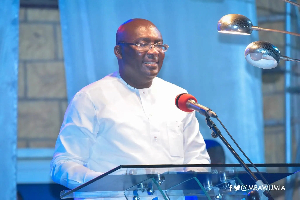The Sustainable Development Investment Partnership (SDIP), an initiative of the World Economic Forum and the OECD, in partnership with the Government of Ghana through the SDGs Advisory Unit in the Office of the President, and the UN Development Programme (UNDP) held the first Ghana SDGs Country Financing Roadmap Roundtable on September 16th 2020 in Accra.
The event connected governmental institutions, donors, multilateral organisations, development banks and private investors to address challenges and opportunities to finance the SDGs in Ghana.
The event highlighted strategies to assist the Government of Ghana unlock capital to finance the SDGs. As the world enters the crucial Decade of Action for the Sustainable Development Goals (SDGs), COVID-19 has caused investors to withdraw more than US$700 billion from emerging and developing markets.
This figure adds to the previous existing financial gap to achieve the 2030 Agenda, undermining prospects for achieving the SDG’s and the development of these countries more broadly.
To achieve the 2030 Agenda, it is abundantly clear that sufficient financing cannot be mobilized from the public sector alone and that countries would need to leverage significant innovative financing from the private sector.
Utilising the SDGs as the recovery framework and to build back better post-COVID, the Roundtable Speakers offered thoughts on challenges and sustainable opportunities to unlock capital for critical SDGs investments in Ghana.
Key Speakers at the Roundtable included Prof. George Gyan Baffour, Minister for Planning; Charles Abani, UN Resident Coordinator in Ghana; Mansa Nettey CEO of Standard Chartered Ghana; Peter Sullivan, Head of Public Sector – Africa at Citi Bank; Runa Alam, CEO, Development Partners International; Lade Araba, Director Africa, Convergence Blended Finance; Susanna Moorehead, Chair of OECD DAC, Ole Thonke, Ambassador, Ministry of Foreign Affairs, Denmark, Eugene Owusu, Special Advisor to the President on the SDGs, Yoofi Grant, CEO, GIPC and Terri Toyota, Head of Sustainable Markets at the World Economic Forum.
At the Roundtable, hosted by Standard Chartered Bank, Runa Alam, CEO, Development Partners International spoke on unlocking bankable finance.
She indicated that Ghana can build on leveraging private equity capital because it has a solid reputation in the international capital market.
She advised that the country develops proper protocols for investors to come in and operate and to prioritise sectors that private equity can invest in.
Lade Araba, Director Africa, Convergence Blended Finance proposed a moving away from a dependence on public debt and reiterated the need to provide the right regulatory environment to attract capital and making revisions to areas of investment to facilitate greater capital inflows.
She stated that Ghana must focus on developing a pipeline of bankable projects as it moves away from a dependence on debt financing.
Susanna Moorehead, Chair of OECD DAC highlighted the need to improve domestic resource mobilization through innovative tax measures.
Ghana is the first African country to partner with SDIP to implement the SDGs Country Financing Roadmap (CFR) project. The CFR represents a strong tool to identify the bottlenecks and impediments that hinder financing for the SDGs in the country, while at the same time considering possible solutions to overcome the barriers, achieve the 2030 Agenda objectives and build a society that leaves no one behind.
The Ghana CFR initiative is funded by the Government of Denmark, the European Commission, and the Swedish International Development Cooperation Agency and builds on existing assessments and experience from the public and private sector, international organizations, civil society and multilateral institutions, with the aim of defining an action plan to scale up financing for the SDGs.
Business News of Friday, 18 September 2020
Source: SDIP Secretariat
SDIP partners govt to host Ghana SDGs Country Financing Roadmap Roundtable
Entertainment
















